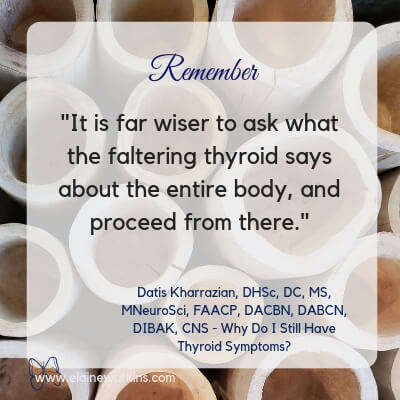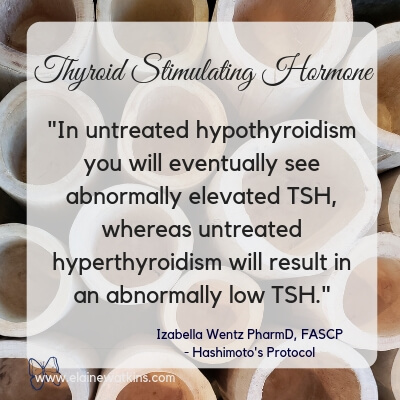Is It Your Thyroid? Thyroid Function, Symptoms, and Testing

For being such a small gland in your body, the thyroid plays a huge role in your life and health. Changes in areas such as your energy, weight, and focus can definitely suggest you look at your thyroid, so today we’re taking an introductory look at thyroid function, symptoms, and testing.
While lab numbers can present a clearer picture if something is going on with your thyroid, there are quite a few symptoms that can reveal the story even before money is spent. And even though many can also tell the tale of issues in other areas, consider one or more from this list as your body sending you a message that something is going on.
Thyroid Function

Your thyroid is a small butterfly-shaped gland located in the front of your neck. It has several very important responsibilities including:
- supporting overall, whole-body cell health and strength
- regulating your heart and blood pressure
- regulating body temperature and breathing
- influencing your menstrual cycle and related ease or difficulty
- playing a significant role in the pace of your metabolism
Suffice it to say your thyroid is an active influencer throughout your bodily functions. It’s also greatly influenced by other functions and organs and a great indicator to you when there is a problem to be addressed.
For such a small gland, it wields quite a bit of power.
Symptoms
Problems can arise, though, and while problems are not Always autoimmune-related, they very often are.
Check out my post titled What is Autoimmune Disease? for additional information on autoimmunity.
But in relation to your thyroid…
We’re focusing on two common problems that are seen when there’s too much or too little thyroid hormone.
Hyperthyroidism and Graves’ Disease
 When too much thyroid hormone is present, you can have an overactive thyroid, hyperthyroidism, and possibly Graves’ Disease. Just a few common symptoms that you might see with an overactive thyroid are:
When too much thyroid hormone is present, you can have an overactive thyroid, hyperthyroidism, and possibly Graves’ Disease. Just a few common symptoms that you might see with an overactive thyroid are:
- trembling
- warm, sweaty
- nervousness, anxiety, and irritability
- weak muscles
- somewhat bulging eyes
- hair loss
- racing heart
- weight loss
- diarrhea
- infertility/miscarriages
- insomnia
Hypothyroidism and Hashimoto’s Thyroiditis
When there is too little hormone, hypothyroidism comes up, with autoimmune Hashimoto’s Thyroiditis being the most common. Just a few common symptoms that you might see with an underactive thyroid are:
- fatigue
- weight gain
- brain fog and focus challenges
- hair loss
- dry skin
- thinning/loss of outermost eyebrows
- constipation
- cold
- swollen neck or goiter
- greater sleep need
- menstrual cycle and infertility challenges
- slow heart rate
- depression or mood swings

Thyroid problems can be due to or affected by illness, nutrient deficiencies, overload on toxicant exposure, high and persisting stress level, emotional or physical trauma, hormone imbalances, medication or a combination of these.
While many of these symptoms don’t Only hint at possible thyroid struggles and Graves’ or Hashimoto’s particularly, the numbers are on the rise.
And there’s much you can do.
TSH
For thyroid function to occur in the first place, a signal (Thyrotropin Releasing Hormone-TRH) is sent from one part of your brain, the hypothalamus, to another, the pituitary gland, based on the level of thyroid hormone the hypothalamus considers present in your blood.
Your pituitary gland then responds by sending a message to your thyroid. That signal is Thyroid Stimulating Hormone, TSH.
Thyroid-Stimulating Hormone, TSH, is usually what you’ll see reported on blood tests. The range generally accepted as healthy is 0.5 – 5.0 IU/mL. This number is what is the commonly sought out number when evaluating thyroid function.
But my TSH was 4.8 IU/mL when I was diagnosed with Hashimoto’s, and I was definitely experiencing quite a few of the symptoms listed above for quite a while.
I was within the range, but did you know that when setting the range, people with thyroid problems were included.
So their unhealthy numbers are part of that acceptable range.
Something else to remember is that a lot of those symptoms could be signals that something else is going on. For me, I had intestinal permeability, also known as leaky gut. And I had autoimmune disease.
We’re not going to talk about leaky gut or autoimmune disease here, but know that the thyroid challenges are more highly seen in women. Also the thyroid is one of the most commonly attacked glands/organs in relation to autoimmune disease.

As far as checking that TSH, some practitioners use a tighter acceptability range. A growing number of endocrinologists are seeking a TSH between 0.3 and 3.0 IU/mL, and many functional medicine practitioners look for a TSH between 1.0 and 2.0 IU/mL.
With either one of those ranges, my TSH would have been flagged and further testing might have done long before my eventual diagnosis of Hashimoto’s Thyroiditis.
Thyroid Testing
But still. The TSH sheds light on one particular part of the process, communication between the pituitary and the thyroid.
And there are other numbers that can be evaluated to reveal information about the possible build up of antibodies, activation of hormone, and more.
Maybe you’ve heard of a thyroid panel?
But wait. Not all thyroid panels are alike. Depending on the lab used, the data collected and reported can vary, as well as the chosen ranges of acceptability vs. “Houston. We have a problem!”
Collecting and reporting additional numbers relating to the thyroid can give a more thorough understanding of how the thyroid is functioning. and possibly shed some light on why. Practitioners and lab resources can vary a bit on what they request and provide, but some numbers that can be helpful include:
- TSH
- T4 – inactive thyroid hormone (stored)
- Free T4 – unbound T4
- T3 – active thyroid hormone
- Free T3 – unbound T3
- Reverse T3 – blocks Free T3 function
- Thyroid antibodies – produced by immune system to attack your thyroid
- TPO Ab – (Thyroid Peroxidase Antibodies) Most common antibodies present when the immune system is attacking the thyroid and causing Hashimoto’s
- TGB Ab – (Thyroglobulin Antibodies) can also sometimes be helpful in determining Hashimoto’s
A high or low result in any of these can tell a story and give you direction about your optimum response. 
More Than Just Your Thyroid
If you decide that something is going on, consider:
- getting copies of your lab results and creating your own documentation history
- seeking out the root cause and making adjustments to minimize or eliminate symptoms
- tracking what your doing and experiencing to make smart changes
- doing your research and asking questions
Two great books that I recommend are:
But also remember that merely covering up symptoms with medication doesn’t stop an attack from continuing to happen.
Seek out the root cause.
Consider your food, stressors, sleep, exposure load from toxicants in your environment, and other health challenges that could be impacting your thyroid function and more.
Three other posts to help you when considering some of these areas are:
- Stress: Causes, Effects, and Management Strategies
- Elimination Diet: How Does It Work? How Can It Help?
There is NO organ, function, or response in your body that works alone.
But you are your best advocate!!!
Pay attention to what you’re experiencing, and I’ve got a great tool that will help you document what you’re daily, as well as what you’re experiencing. Get your copy of my Daily Health Tracker Here:![]()
Gather information.
Ask questions.
Make changes.




Thank you for this valuable information! I was recently diagnosed with hypothyroidism.